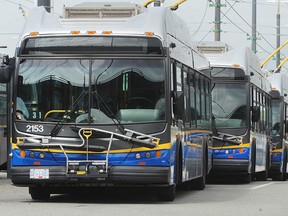The transit agency’s joint board and mayors’ council approved the increase in bus service, but remains on a fiscal cliff without a secure funding commitment

Article content
TransLink plans to increase service on 60 bus routes, extend late-night hours on 11 routes, increase SkyTrain frequency at peak hours, and put additional cars on the West Coast Express this year as a “stopgap” move in implementing its 10-year capital plan.
The 2024 additions will be TransLink’s first increase in bus service since 2019, which were approved Thursday by a joint meeting of TransLink’s board of directors and mayors’ council, to be paid for by fare increases due in July, a bump in property taxes, and emergency infusions of funds from the province.
Advertisement 2
Article content
Article content
However, CEO Kevin Quinn called the small increases short-term measures to relieve overcrowding as “a stopgap to bridge us to our next investment plan.”
He added that the agency is still on track to “hit a fiscal cliff” by 2026 and “without additional funding, we won’t have enough revenues to cover the cost of keeping the current system running let alone funding much needed expansion.”
Thursday’s joint meeting was the mayors’ council’s first gathering since learning that their pleas for more secure, continuing operating funding from the federal government went unanswered in Finance Minister Chrystia Freeland’s 2024 budget.
Mayors’ council vice chair Mike Hurley, mayor of Burnaby, said the federal government’s vague promises for future support aren’t helpful, “you have to come to the table, you can’t just lower all these problems down to municipalities.”
Most immediately, Quinn said TransLink is scrambling to cope with a population increase of 90,000 in 2023 alone, double what the agency had planned for, with more than half the newcomers relying on transit for transportation.
Article content
Advertisement 3
Article content
The list of 2024 improvements, which will take effect in September, add up to a three per cent increase in bus service, to begin dealing with overcrowding south of the Fraser River and on rapid transit as well as improve off-peak service throughout the region, according to Sarah Ross, TransLink’s vice-president for transportation planning.
Ross added that the 2024 plan will include an earlier start to SeaBus service to the North Shore and support late-evening HandyDART service to “improve accessibility for those who cannot use the conventional system.”
“This plan also funds foundational investments in bus fleet and facilities, thanks to the support of the B.C. government, that will prepare us to deliver the access for everyone plan as soon as possible,” Ross said.
The plan includes the $300 million in capital funding committed by the province last week, the balance of the $479 million in emergency funding B.C. extended to TransLink last year.
Ross said fare increases, averaging 2.3 per cent, due to take effect July 1 will also help pay for the expansion as well as a one-per-cent increase in TransLink’s regional property tax.
Advertisement 4
Article content
Recommended from Editorial
Bookmark our website and support our journalism: Don’t miss the news you need to know — add VancouverSun.com and TheProvince.com to your bookmarks and sign up for our newsletters here.
You can also support our journalism by becoming a digital subscriber: For just $14 a month, you can get unlimited access to The Vancouver Sun, The Province, National Post and 13 other Canadian news sites. Support us by subscribing today: The Vancouver Sun | The Province.
Article content





